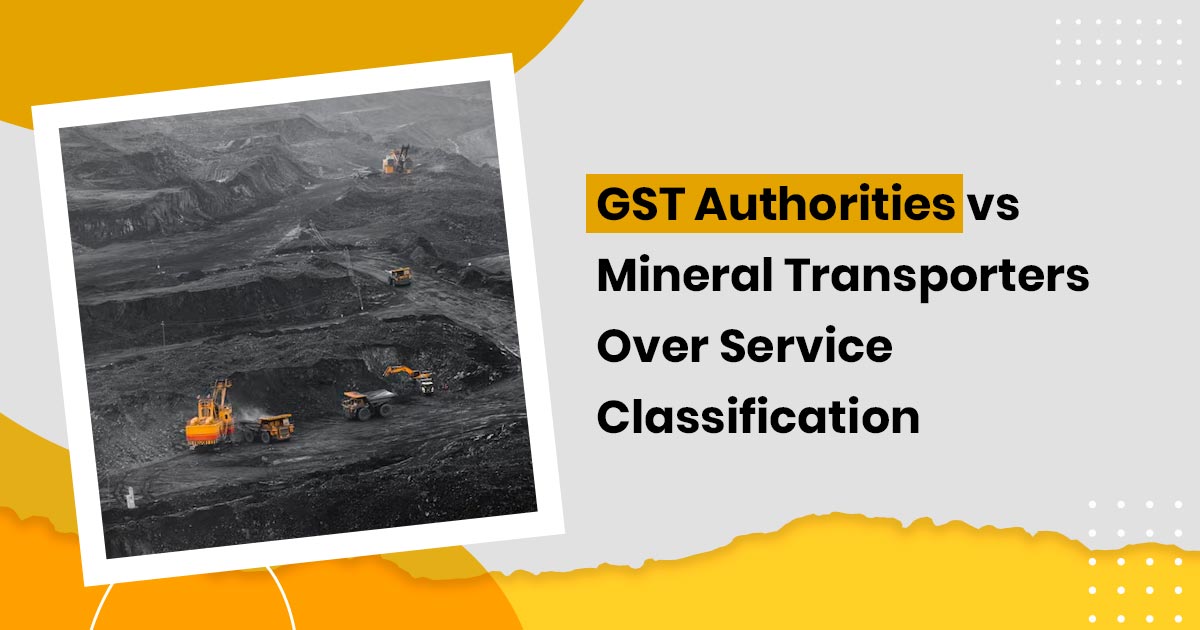
Numerous legal disputes have resulted from the GST demand for the delivery of materials, such as coal, to mining businesses. While tax officials depend on a circular released in August, carriers, and experts, disagree that such a method is not justified.
Transportation vs rental services is the main points of disagreement. Mining firms used to pay GST under reverse charge for transport services, considering the carriers as goods transport agencies (GTA). GST officials contend that the services offered by the carriers are actually tipper and vehicle rentals, not actual transportation. Transporters have been required to pay GST at 18% under the forward charge, which will be reduced to 12% as of July 18, 2022, in order to treat this as a rental service.
Post issuance of the circular last August by the Central Board of Indirect Taxes & Customs (CBIC) the same problem would have been complicated, after the GST council the suggestions concerned with the taxability and GST subjected to get applied on the transport of the minerals from the mining pit head to a railway siding, beneficiation plant, and others, through the vehicles deployed with driver for a certain time period.
Mining lease
According to the circular, in such circumstances, vehicles like tippers, dumpers, loaders, and trucks are often rented to the mining lease operator. Fuel expenses are often met by the service receiver. During the contract duration, the mining lease operator can use the vehicles with drivers to transport minerals inside the mine area (mining pit to a railway siding, beneficiation plant, etc.).
Read Also: Reject Coal Gets GST Exemption by Authorised Council Members
The person who rents the vehicle specifies when and how it will be used, as well as the timetables, routes, and other operational factors.
The individual with the operator who rents the vehicles could not say to be as supplying the services through the method of goods transportation. As per the suggestions through the GST council, “it is clarified that such renting of trucks and other freight vehicles with driver for a period of time is a service of renting of transport vehicles with the operator and not service of transportation of goods by road.” GST will be levied on this as per the same concern.
Long-standing Situation Service
From the previous service tax regime, it has been a time-hallowed concern for coal carrier service providers to classify the service of the transformation of coal from the mining area to railway sidings.
Before June 2007, the service tax authorities argued that these services belonged to the category of cargo handling services. Later, until the implementation of the negative list system, they were claimed to be categorised as mining services. However, throughout the service tax regime, the judiciary consistently identified these services as ‘transportation of goods by road’.
Organizing GST Related Services
The GST officials are making another attempt under the new regime to designate these services as rental arrangements. “In our view, the scope of services, terms, and conditions outlined in the contracts play a crucial role in determining the intended activities to be performed by the service provider for the service recipient.
Thus, while specific agreements need to be reviewed to provide definitive views, a preliminary examination of a few available contracts, in general, suggests that the emphasis is primarily on transportation arrangements rather than rental agreements. Thus, the demand of 18 per cent GST under forward charge for such kind of arrangements may not be completely correct unless otherwise proven,”









